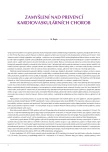-
Medical journals
- Career
Dual anti-aggregation therapy in the prevention cerebral infarction
Authors: Goldemund; R. Mikulík
Authors‘ workplace: I. neurologická klinika LF MU a FN u sv. Anny, Brno
Published in: Kardiol Rev Int Med 2007, 9(2): 120-123
Category: Editorial
Overview
Dual anti-aggregation therapy in the prevention cerebral infarction. Ischemic cerebrovascular accidents (CVA) are injuries with a high rate of occurrence. According to information in the IKTA database of 2000, the rate of occurrence of cerebral infarction or transitory ischemic attacks is 250 per 100 000 inhabitants. For 90 days following a transitory ischemic attack, a patient has a 10% risk of another ischemic CVA. There is 7.4% risk that a patient with cerebral infarction will suffer recurrent cerebral infarction within 90 days, and a 40% chance within 5 years. The objective of anti-aggregation therapy is to prevent recurrence of the events, though the effect of traditional treatment with acetylsalicylic acid and thienopyridine derivatives (ticlopidin, clopidogrel) is relatively low (e.g. ASA produces an annual reduction in absolute risk of around 1%). The text summarizes recent experience with dual anti-aggregation therapy, based on the recently published MATCH, CHARISMA and ESPRIT studies.
Keywords:
cerebral infarction – anti-aggregation – prevention – dual anti-aggregation therapy
Sources
1. United Kingdom transient ischaemic attack (UK–TIA) aspirin trial: interim results. UK–TIA Study Group. Br Med J (Clin Res Ed) 1988; 296 : 316–320.
2. Bellavance A. Efficacy of ticlopidine and aspirin for prevention of reversible cerebrovascular ischemic events. The Ticlopidine Aspirin Stroke Study. Stroke 1993; 24 : 1452–1457.
3. A randomised, blinded, trial of clopidogrel versus aspirin in patients at risk of ischaemic events (CAPRIE). CAPRIE Steering Committee. Lancet 1996; 348 : 1329–1339.
4. Ringleb PA et al., Benefit of clopidogrel over aspirin is amplified in patients with a history of ischemic events. Stroke 2004; 35 : 528–532.
5. Diener HC et al. European Stroke Prevention Study. 2. Dipyridamole and acetylsalicylic acid in the secondary prevention of stroke. J Neurol Sci 1996; 143 : 1–13.
6. Ariesen MJ, Algra A, Kappelle LJ. Antiplatelet drugs in the secondary prevention after stroke: differential efficacy in large versus small vessel disease? A subgroup analysis from ESPS-2. Stroke 2006; 37 : 134–138.
7. Sacco RL, Sivenius J, Diener HC. Efficacy of aspirin plus extended-release dipyridamole in preventing recurrent stroke in high-risk populations. Arch Neurol 2005; 62 : 403–408.
8. Lindgren A et al. Dipyridamole and headache – a pilot study of initial dose titration. J Neurol Sci 2004; 223 : 179–184.
9. Humphreys DM et al. Dipyridamole may be used safely in patients with ischaemic heart disease. Int J Clin Pract 2002; 56 : 121–127.
10. Diener HC et al. Does early high dosage dipyridamole in prevention of secondary stroke induce cardiac events? Z Kardiol 2001; 90 : 348–351.
11. Picano E. Dipyridamole in chronic stable angina pectoris; a randomized, double blind, placebo-controlled, parallel group study. Eur Heart J 2001; 22 : 1785–1793.
12. Gibbons RJ et al. ACC/AHA 2002 guideline update for the management of patients with chronic stable angina – summary article: a report of the American College of Cardiology/ American Heart Association Task Force on practice guidelines (Committee on the Management of Patients With Chronic Stable Angina). J Am Coll Cardiol 2003; 41 : 159–168.
13. Diener HC et al. Aspirin and clopidogrel compared with clopidogrel alone after recent ischaemic stroke or transient ischaemic attack in high-risk patients (MATCH): randomised, double-blind, placebo-controlled trial. Lancet 2004; 364 : 331–337.
14. Bhatt DL et al. Clopidogrel and Aspirin versus Aspirin Alone for the Prevention of Atherothrombotic Events. N Engl J Med 2006; 354 : 1706–1717.
15. Barer D. Interpretation of IST and CAST stroke trials. International Stroke Trial. Chinese Acute Stroke Trial. Lancet 1997; 350 : 440; author reply 443–444.
16. Shah H, Gondek K. Aspirin plus extended-release dipyridamole or clopidogrel compared with aspirin monotherapy for the prevention of recurrent ischemic stroke: a cost-effectiveness analysis. Clin Ther 2000; 22 : 362–370; discussion 360–361.
17. Prognosis of patients with symptomatic vertebral or basilar artery stenosis. The Warfarin-Aspirin Symptomatic Intracranial Disease (WASID) Study Group. Stroke 1998; 29 : 1389–1392.
Labels
Paediatric cardiology Internal medicine Cardiac surgery Cardiology
Article was published inCardiology Review

2007 Issue 2-
All articles in this issue
- The role of echocardiography in biventricular pacing
- Myocardial infarction in elderly pacients
- Admission blood glucose level as a risk factor in patients with and without diabetes mellitus after acute myocardial infarction
- Acute coronary syndromes – therapy of hyperglycaemia
- Ezetimibe – simvastatin fixed combination of (inegy) in the treatment of hypercholesterolemia – combination therapy or monotherapy?
- Dual anti-aggregation therapy in the prevention cerebral infarction
- Acute myocardial infarction in renal insufficiency II: Contrast induced nephropathy, modern continuous elimination methods, importance of troponin evaluation
- Cardiology Review
- Journal archive
- Current issue
- Online only
- About the journal
Most read in this issue- Dual anti-aggregation therapy in the prevention cerebral infarction
- Acute coronary syndromes – therapy of hyperglycaemia
- Myocardial infarction in elderly pacients
- Acute myocardial infarction in renal insufficiency II: Contrast induced nephropathy, modern continuous elimination methods, importance of troponin evaluation
Login#ADS_BOTTOM_SCRIPTS#Forgotten passwordEnter the email address that you registered with. We will send you instructions on how to set a new password.
- Career

